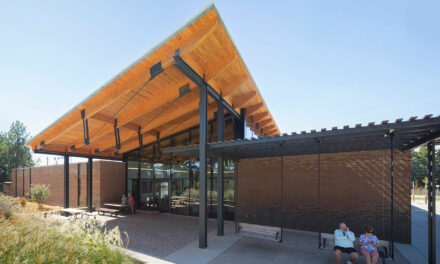Washington, D.C. (April 30, 2019) – This week, the House of Representatives will vote on H.R. 9, the Climate Action Now Act. This bill effectively blocks the president from withdrawing the United States from the Paris Climate Agreement and requires the president to put forth a plan to achieve 26-to-28% reduction in greenhouse gas emissions below 2005 levels by 2025, as proposed by the U.S. under the agreement.
The House will also vote on an amendment to H.R. 9 that highlights the Paris Agreement’s commitment to environmental justice for vulnerable communities and for gender equity.
“In the Paris Agreement, the U.S. made a commitment to reduce our carbon emissions and start combating this growing threat to our communities. While some may want out, ASLA is still in,” said Nancy Somerville, Hon. ASLA, Executive Vice President and CEO of the American Society of Landscape Architects. “We applaud the House of Representatives for taking bold steps in H.R. 9 to uphold U.S. commitments in the Paris Climate Agreement – and for including an amendment addressing the need for environmental and climate justice in this process.”
ASLA is an official signatory of the “We Are Still In” declaration –a joint statement of support for the Paris Agreement signed by governments, academia, and the private sector. The bipartisan coalition includes over 3,500 representatives from all 50 states, representing more than half of all Americans when taken together.
“Landscape architects design resilient and sustainable outdoor environments that can withstand the severe weather conditions and natural disasters exacerbated by climate change,” continued Somerville. “The threat climate change poses to our communities crosses party lines and affects people of all backgrounds.”
The House vote on H.R. 9 comes as ASLA leaders head to Capitol Hill for ASLA’s Advocacy Day 2019, where they will appeal to their elected officials for investments in climate-resilient, sustainable infrastructure.
“In 2016 and 2017, the transportation sector was the number one source of CO2 emissions in this country,” said Roxanne Blackwell, Esq., Director of Federal Government Affairs at ASLA. “If we’re going to meet the goals set out in the Paris Climate Agreement, we need more of the kind of policies our leaders are supporting this week, including active transportation projects, like Complete Streets, Safe Routes to School, recreational trails, and more.”
Background
Based on the scientific evidence about the causes and impacts of climate change, the American Society of Landscape Architects recognizes that global climate change presents a serious threat to humans and our environment. The United Nations Intergovernmental Panel on Climate Change (IPCC) in its most recent report says the impact of a 1.5 degrees Celsius increase in global temperatures will “disproportionately affect disadvantaged and vulnerable populations through food insecurity, higher food prices, income losses, lost livelihood opportunities, adverse health impacts, and population displacements.” Further, an internal report issued by thirteen federal agencies within the Trump Administration, stated that “Climate change creates new risks and exacerbates existing vulnerabilities in communities across the United States, presenting growing challenges to human health and safety, quality of life, and the rate of economic growth.”
In 2017, ASLA convened a Blue Ribbon Panel on Climate Change and Resilience to offer communities strategies for adapting to global climate change and its impacts on human health and the environment. Their report, Smart Policies for a Changing Climate, identified the following core principles, key planning and design strategies, and public policies that will promote healthy, climate-smart, and resilient communities. You can read the report in its entirety on the ASLA website.
The American Society of Landscape Architects is also an official signatory to the “We Are Still In” declaration. The bipartisan coalition includes over 3,500 representatives from all 50 states, spanning large and small businesses, mayors and governors, university presidents, faith leaders, tribal leaders, and cultural institutions. “We Are Still In” signatories represent more than half of all Americans and, taken together, $6.2 trillion of economic activity.




